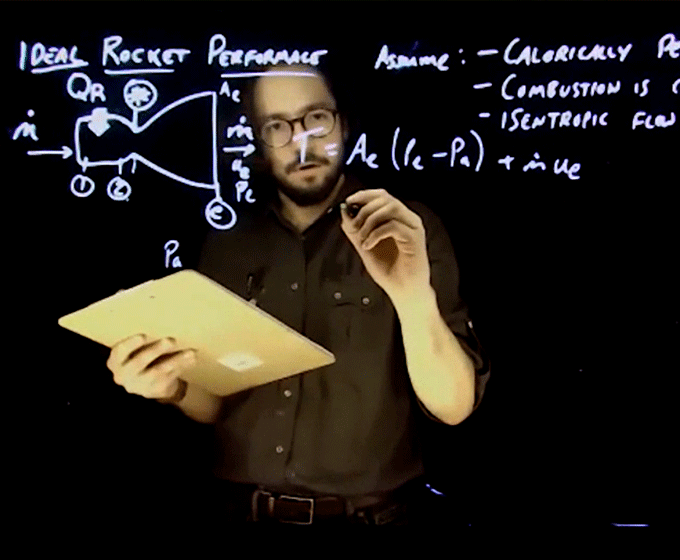
FEBRUARY 12, 2024 — Daniel Pineda said he never expected to teach, much less work with rocket propulsion or lasers. Now he’s starting his fourth year as an assistant professor of mechanical engineering at the Margie and Bill Klesse College of Engineering and Integrated Design with rockets and lasers driving his research.
Pineda has been selected to receive a National Science Foundation (NSF) Faculty Early Career Development (CAREER) Award of $579,000 to support his research toward finding the next generation of cleaner, carbon-based, renewable fuel sources. The funding will also help Pineda build outreach programs to help South Texas middle and high school students develop an interest in pursuing STEM careers.
“I walked into working with rockets and lasers by accident,” Pineda said. “My plan was to work on cars and design new engines. But by the time I was done with my Ph.D., the automotive combustion engine did not have a long future.”
Today he’s recreating superheated molecular collisions — like those in rocket launches — and using lasers to discover what molecules are left behind. He is looking for carbon-free combinations. Pineda and his students use a 28-foot-long, 1,100-pound “shock tube” built by his first Ph.D. student. The tube quickly generates heat beyond 17,000 degrees Fahrenheit and dissipates it in milliseconds.
“These reactions form and disappear so fast that traditional measurements like mass spectrometers won’t work,” Pineda said. “Laser diagnostics are the only way to measure. It requires a background in spectroscopy.”
He said anyone who knows why they get sunburned on a cloudy day has a basic understanding of spectroscopy. Clouds absorb the infrared light of the sun but the water vapor in the clouds reflects the ultraviolet light which causes the burn.
Students interested in being part of Pineda’s Laser Spectroscopy and Chemical Propulsion Laboratory need to know quite a bit more about spectroscopy than that. They must complete rigorous prerequisites to join. That includes a spectroscopy class taught in the chemistry department that would not be offered if the university were not a Tier One research university, according to Pineda.
“These are the interdisciplinary approaches that are required to solve the societal problems we work on here at the university,” he said.
Pineda is a proud graduate of San Antonio’s public school system and was enrolled in the PREP programwhere he was first introduced to the world of engineering. He graduated as valedictorian from Ronald Reagan High School in the North East Independent School District in 2008.
After graduation, he left San Antonio for the University of Texas at Austin, where he studied in a combustion laboratory, earning his Bachelor of Science degree in mechanical engineering. He went on to the University of California, Berkeley, where he earned his Master of Science and Ph.D. in mechanical engineering. Pineda followed that up with an NSF grant to UCLA, which required him to mentor the undergraduate rocket club.
“That became a really big focus for me,” he said. “I didn’t know I was going to be a professor, but I discovered I love teaching.”
It also led him to another discovery about the willingness to step outside of one’s comfort zone. Something that is huge for first or second-generation college students, especially at a school like UTSA, where nearly 45% of undergraduates will be the first in their families to earn a college degree.
“Stepping outside their comfort zone is where the real learning happens,” Pineda said. “There was a time when I didn’t know anything about rockets or lasers. When I started at UTSA, I’d only been working with them for three years. Now they’re the foundation of my research and education program. With the right resources and mentorship, anything is possible.”
UTSA Today is produced by University Communications and Marketing, the official news source of The University of Texas at San Antonio. Send your feedback to news@utsa.edu. Keep up-to-date on UTSA news by visiting UTSA Today. Connect with UTSA online at Facebook, Twitter, Youtube and Instagram.
Move In To COLFA is strongly recommended for new students in COLFA. It gives you the chance to learn about the Student Success Center, campus resources and meet new friends!
Academic Classroom: Lecture Hall (MH 2.01.10,) McKinney Humanities BldgWe invite you to join us for Birds Up! Downtown, an exciting welcome back event designed to connect students with the different departments at the Downtown Campus. Students will have the opportunity to learn about some of the departments on campus, gain access to different resources, and collect some giveaways!
Bill Miller PlazaCome and celebrate this year's homecoming at the Downtown Campus with food, games, giveaways, music, and more. We look forward to seeing your Roadrunner Spirit!
Bill Miller PlazaThe University of Texas at San Antonio is dedicated to the advancement of knowledge through research and discovery, teaching and learning, community engagement and public service. As an institution of access and excellence, UTSA embraces multicultural traditions and serves as a center for intellectual and creative resources as well as a catalyst for socioeconomic development and the commercialization of intellectual property - for Texas, the nation and the world.
To be a premier public research university, providing access to educational excellence and preparing citizen leaders for the global environment.
We encourage an environment of dialogue and discovery, where integrity, excellence, respect, collaboration and innovation are fostered.